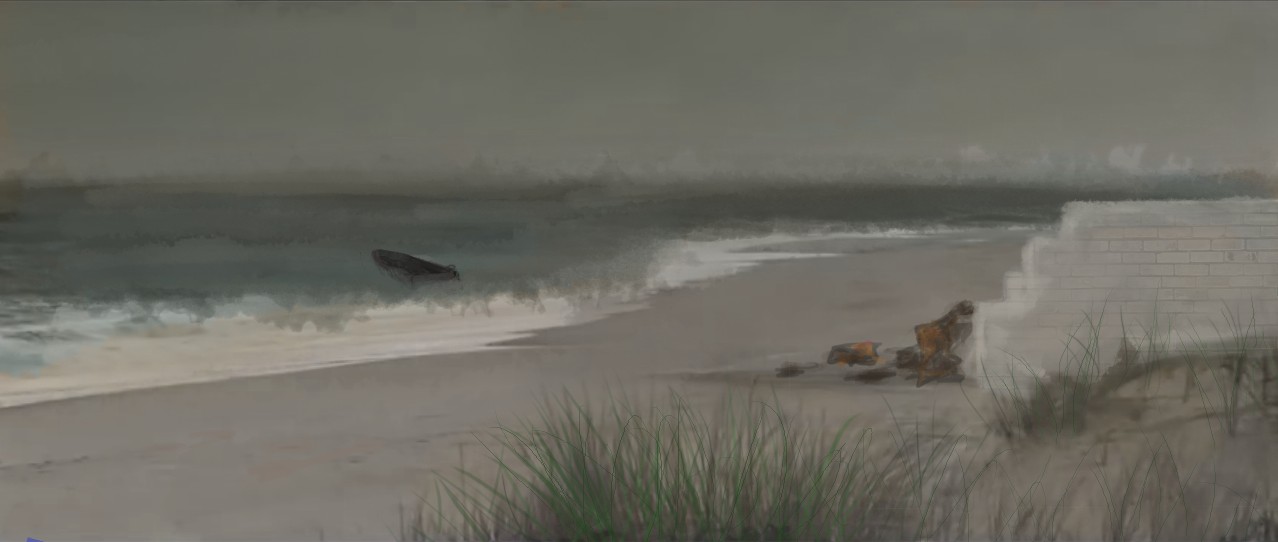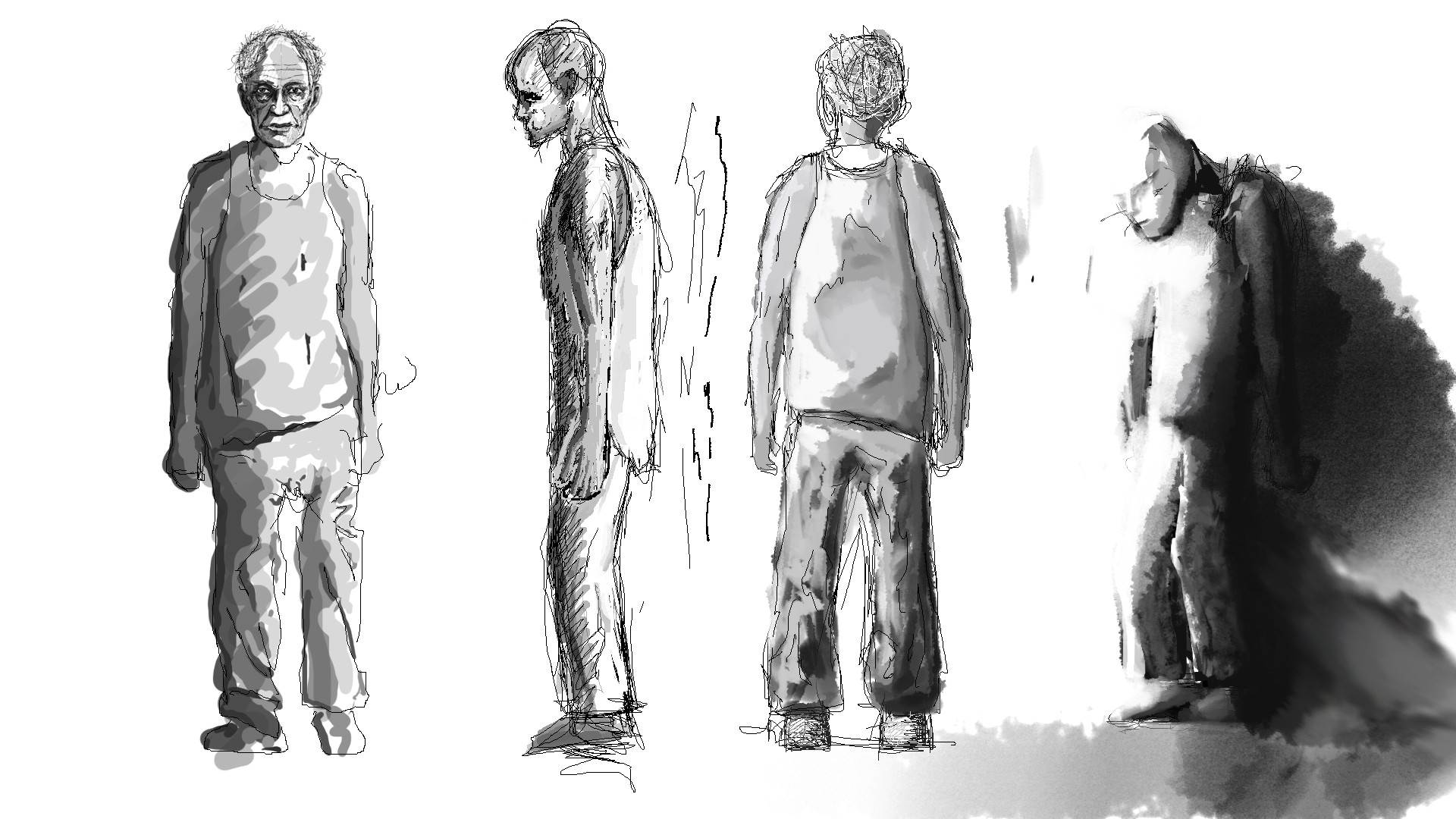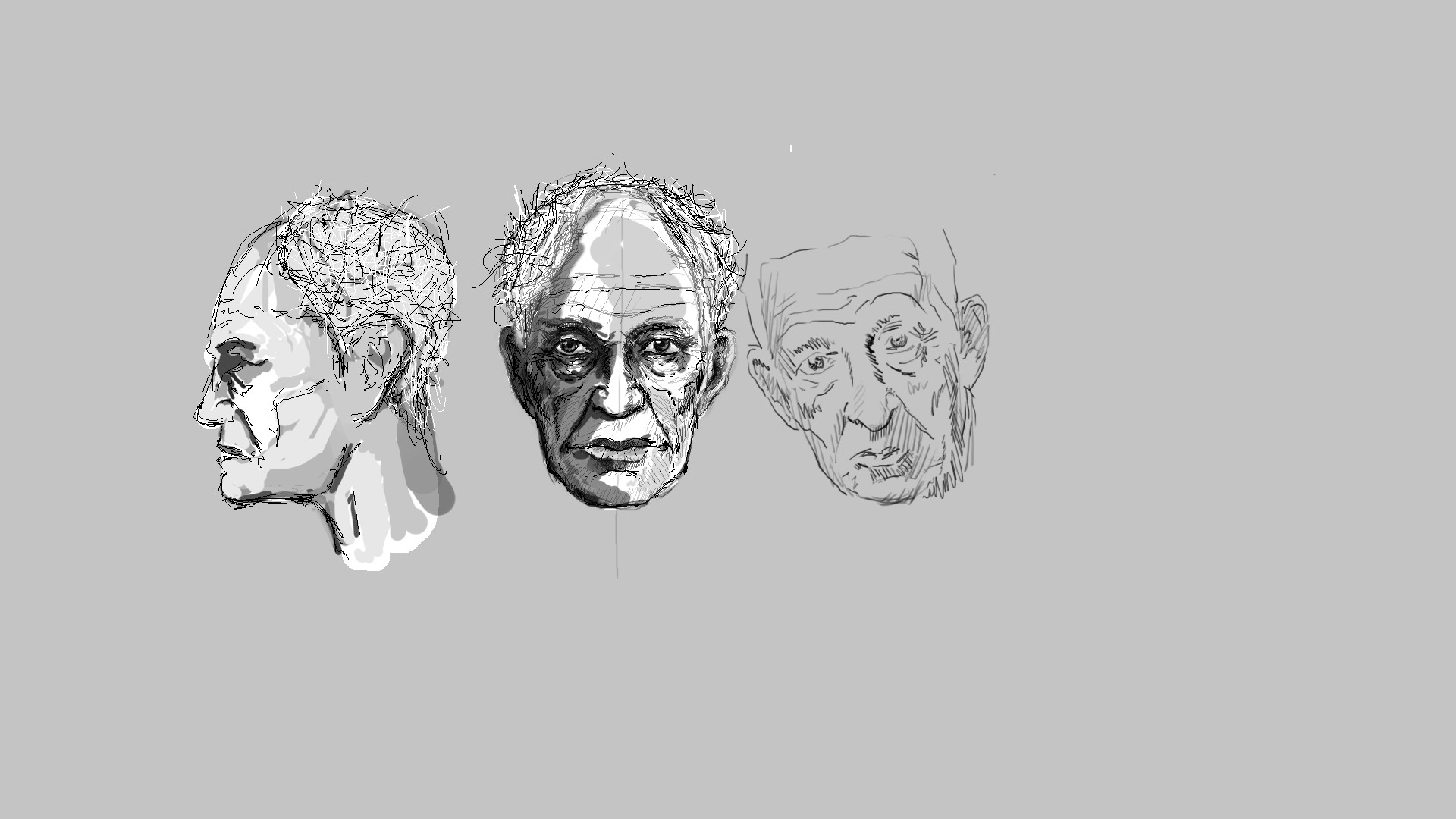



The task was to create a story and a character.
The tale of the fisherman and the fish.
A famous Russian poet and writer of the 19th century, A.S.Pushkin, wrote a short fairytale in the year 1835. By the way, the story was based on even older Russian folklore. In it, a fisherman catches a goldfish in the sea. The latter, on the promise of letting her go, would fulfil his any wish. He does not ask for a wish, and lets the fish go. But his wife was not satisfied with it when he came back to tell her of his adventure. She told him to demand something from the fish. Namely, it was a broken basin for washing clothes that needed replacing. The old man asked the fish, and the fish delivered.
The next day, however, the wife said – we need a new house. Ask the fish for a new house. And the man went and asked the fish.
Then the wife wished for a higher social standing, for a palace, to become a queen, and finally to become something akin to a god.
Increasingly dissatisfied with the woman’s demands, the fish simply takes it all away after hearing her last wish.
Like all fairytales, this one has connotations for both children and adults. But I would like to go further than a simple Aesop’s fable, and add depth to both main characters, and introduce conflict that didn’t exist in the story before – one that is emotional, between the fisherman and the wife.
Let’s turn this into an attempted, failed-coming-of-age story, for an old man.
The goldfish here apparently does not exist at all. The story is levelled down to something much more realistic, humanistic, to something everyday-ish.
The goldfish is not some metaphor either, though. It is not said throughout the story whether the goldfish actually exists or not. If you’ve seen Inception, or Life of Pi – those films tried with different degrees of success to establish a doubt in the viewers’ minds: was it all real or not?
I want to keep a hint of that suspense here. It doesn’t need to be the crux of the movie – I don’t want it to be. But it adds to the flavour palette. A little mystery – that’s the feeling you are left with after trying to deal with people, and people’s emotions. You are left with uncertainty, doubt, some hope, and often disappointment.
The movie revolves around a broken marriage; a childish, naïve old man, who tries to reach one more time for love that he never got in his life; and his wife, a woman that might at first seem an antagonist, a villain, who actually was disappointed in her life as well, and disappointed in where she arrived at at the end of her journey. She is upset with her husband’s failure, but she in fact has also failed.
The goldfish is a means through which the old man tries to communicate with his wife. Their usual conversations do not connect them. They are limited to discussing their means of physical existence. The husband tries to incite something soulful with the help of the fish, but seems to have failed.
In the movie, what was seemed to start as a failed reach by the old man to unite a little bit with his wife – and nothing more than that – becomes the channel to unleash the dissatisfaction accumulated throughout their whole life at each other, and/or perhaps themselves, which results in a conflict that will change their stagnant life – unfortunately not for the best.
My version of this story would be set in a 90s post-soviet Russia. The old man would be a fisherman who would live with his elderly wife in an old, barely-standing apartment block, where half of all doors would be boarded up. His wife is staying at home most of the time, while he would go out in the day to fish for food.
The environment feels both dusty and lawless. He walks by the ruins of gray brick houses every morning to his old shaggy boat. The motor groans and spits, but with a few coughs of black thick smoke it takes his boat off the shore.
Every day he tries to bring at least a little fish home, hopefully so he can sell the rest for a slight variation in diet. Sometimes he has enough to sell; sometimes he perhaps has enough to eat.
The story revolves around his coming home. Besides first introducing his world in a series of cuts, which reveal but don’t thoroughly explain the whole picture – his life is shown somewhat dreamily as we see the titles and introductory music and tempo gain traction – besides all that, we never see him fishing, or going outside, at least at first. Every day is in the beginning presented as him coming back home. The aesthetic style is very thick and realistic. Think Tarkovsky or, perhaps another, newer director called Andrei Zvyagintsev.
One time he comes home and says:
– Dear, I caught a magical fish today.
Obviously a lie. He attempted to offer his wife an escape from their (his) toiling reality in a dream.
– She said she would make one wish come true.
You would think, she would answer something sweet. Naturally, what he said was a lie, and it is clear – especially to a woman, you might think – that he wished for an intimate moment, a lovely fantasy for the two of them. It wasn’t, perhaps, something overly serious, not an act he put on with deliberate effort – but not so much to call it an innocuous remark.
She smiles and motions him to come closer to her – to sit beside her on the bed – which also serves overtime as both a sofa and a chair. She has noticed that the old man desires her soul’s attention; she motions him to cut through the silly game (the goldfish story) and sit with her, perhaps talk about their past, their worries, perhaps to talk how their situation – the poverty, the lack of kids or future – how it does not matter. Maybe they used to imagine, when young, that they are strong – stronger than circumstances, that they can pull through, even if now it is country-wide ruin and the ruthless clock they will have to battle. He sits near her. She smiles widely and says:
– Well aren’t we lucky. Why, dear. Tell her: let her give me a new dress!
The man by now expected an answer a bit different. He thought she would like to speak directly unto him, yet she actually decided to play along with his game instead.
Well, that’s what he wanted at first, anyway. Maybe he got his hopes up because he saw what wasn’t there. Was overly hopeful.
– …
But it still was somehow a bit disappointing. The wish wasn’t romantic or interesting. It didn’t speak to him at all. Its arrow glanced the aim instead of scoring a hit.
It’s not like he had in mind what he wanted her to say. But maybe, maybe she wouldn’t actually make a wish straight like that; that is, indeed, a little silly. Maybe she would remember something romantic from their past. “Ah. Remember, dear? When we were on a holiday at the Black Sea? I wished so much for those striped, very European slippers. The ones that for some reason reminded me of Italy, remember? At that time, I swear, I would give anything for those slippers. For a pair of slippers, can you imagine? So stupid,” – she would laugh, “I would give the world for those back then. And then – remember – I would talk to you about those slippers until one more word and you would strangle me, I swear! You never said that, but I knew. So yes, remember that? And we were walking, and I was telling you about Italy – and obviously the slippers were at the back of my mind. And then, can you imagine, a seagull flew by and dropped a dirty old slipper. I nearly died from laughter back then – and you didn’t even know why. Just stood there like an idiot, and you didn’t know I only talked to you about Italy to talk to you about the slippers” —
The old man might have gotten carried away in thinking what it could have been. It wasn’t that, that’s for sure.
And maybe, he just wanted them to think of this silly wish – get those slippers, even. They’d write it on a piece of paper, and put it in a bottle. Go to the sea and throw the bottle there.
The sea is his domain. It’s where his soul lives. So he wants his wife to go there with him for once – not just to go there; he wants her to want to go there with him, to see the beauty of the sea – the vast horizon, the deep black starry sky above – it’s a place of dreams; a home to a homeless romantic. Maybe if she could see his soul there, he could also have a glimpse of hers.
Instead, she stayed with him on the surface.
Her reply didn’t mean anything. Slippers or a dress, what would be the difference you’d ask? It didn’t resonate with their shared memories. It was dismissive. But maybe she actually wanted a dress. They are poor. She could never look beautiful in those conditions before, and never will anymore no matter what – old age and all. Maybe she was trying to say that to him, he considered. He did not fully understand her.
He was not completely wrong. She did reject him – maybe she did or didn’t know it with her head, but she did reject him at least out of feelings and reflex. Her reason wasn’t what he thought though.
This man let her down in her eyes. The husband knew full well the terms of their marriage – he isn’t a complete fool. He just failed her. She would be a good wife. She would give him warmth and love, yes she would. But why, she has needs in return – she needs something from him. Status, money, adventure? Or, no wait, maybe just the means to not exist in these horrible goddamn conditions. And he now comes home and begs her for happy reminiscence of their youth? He can’t even put food on the table.
Like hell. He is getting her cold shoulder, and he should know better.
And there we go. You see, unfortunately our two weren’t a good match. The old man is quite fragile and childish in his emotions. He is somewhat a desperate person.
The wife, she might at first seem abusive. She got with him to depend on him, but ended up in ruin together with this guy. You can see why she is generally more snarky than you would otherwise expect. But, you know, we all have our expectations from relationships. You can’t blame the man either – the nineties was an age of financial ruin, it was unpredictable and dangerous.
Both had demands and needs not fulfilled. And nobody perhaps took the first step, started the chain reaction.
Maybe if he was able to provide to his wife what she wanted, he’d get back from her what he desired, in turn. Sure, it wouldn’t be a perfect loving lovely couple; lovers should give their emotions for free without an expectation of return, but these two would have a sort of an economic relationship. But the man would still get warmth, the woman would still get ease and convenience – man with a back which to be behind. They’d both be happy, to a degree. That’s still good.
At first it might have been, “why aren’t you satisfied with what I provide you with?”, but in the end it always should have been, “why don’t you love me?”.
– Why, how cute is that! You know, dear. You know, let her get me a new dress. —
Why, you could say – she thought he started a game. You start a game, you stick to your guns. There’s a magical fairy, eh? Well if you’re finally asking me what I want, I’ll tell you what I want. A dress. Yes, a simple dress, how about that? But you can’t even do that, can you.
It comes from her resentment. She’s upset with him, her life. She’s also a human, we work in strange ways. Probably it’s her – unconscious – way of signalling to him what bothers her. It’s how we actually communicate. If you learn to pick up on it, a lot becomes clearer. Supposedly, that is.
– –let her get me a new dress. You know how long I wanted a new dress for, you do. Oh what a nice occurrence!
The fisherman bites. Next week is upon us.
Obviously he could not afford a dress. The thought crossed the back of his head, but it was so far outside the realm of possibility. Besides, it’s about his dignity. The situation now is a conflict; would he like to crack her harsh shell and get to the soft, warm love beneath it? She does love him, surely. Maybe. Maybe that’s only what he thinks.
A week passes, and it is evening. The old man comes home, and asks the wife again.
– You know, I caught the goldfish today again.
He puts his ever so tiny loot down and starts to untie his shoes.
– I asked her for a dress today. She’ll bring you a dress next Sunday. Maybe you want something else meanwhile? The goldfish can make it real.
The old man did feel guilty for not bringing home a dress – he shouldn’t, of course, but he still does. He doesn’t really know what he is expecting, but maybe this situation will turn around.
You would think it was only a marginal thought in his head, but he really did hope so. In fact, his whole emotional balance depended on her cutting this game out – stopping this humiliation, and understanding him for once.
But he gets the cold shoulder again. The wife asks for something even more ridiculous this time. It doesn’t exactly matter what it was at this point. Let’s say, it was a car. They cannot afford to buy – buy anything – but in this case, they cannot afford some dress. So whatever it was that she asked, it was obvious that she was playing a game with him. Her own game – and she’s trying to turn his attention to her needs.
Did the old man see that? Is that why he tried doing what he did? Or was the reason different. Maybe he still was blind to that; he wanted to turn her sight to his needs. And the story takes its next turn.
Let me digress for a moment and instil a mental picture into your mind. Imagine last time you saw kids playing. Imagine two kids arguing about a toy – whom it belongs to? Barely holding in tears, they stubbornly take it from each other’s hands, as if taking turns. Kid A grabs the plush rabbit and pulls it to his side. Stares with a wild mix of emotions whose simultaneous range is available only to a child – stares with those eyes at the other kid. And the only thing kid A can do is stare, holding in the tears, because he is so overwhelmed by those emotions; for that reason he cannot do anything else. He is not capable of taking a step out of the situation, of solving it. It takes all of his strength to simply stand on his two feet, hold the rabbit, and look at the other boy.
And from the other side looks the mirror copy of this kid. And it is his turn: he grabs the rabbit, and pulls it out of Kid A’s hands. And the circle goes on.
A very silly picture. But our two adults are no different.
From this point on, the old man enters a losing fight. He accumulates her wishes one after another, yet decides to fulfil them all. It takes his all to just try and get her a dress. What will he do to get it? Sell something crucial, like his boat? Steal something, land into trouble, borrow something he couldn’t pay back? Whatever he does, it will be wrong; he shouldn’t do that.
And he brings it to his wife. But by this time, his something changed. It’s not a sign of submission. He is not banging at a brick wall. No, at this time, it’s an act of defiance.
She expects him to struggle. To finally realise – all this while she wanted him to buy her a dress, and now it’s surfaced, and he will suffer for all the time that he wasn’t realising that. But the idea is that he wouldn’t be able to buy her a dress. That’s the foundation of this game.
And yet he does. She understands what this means. It means he will not catch fish anymore, maybe he doesn’t have a boat. Or that he will not be able to live in that house anymore, maybe he made an enemy.
But above all, this means he will not be providing for her anymore – at all. It’s impossible.
It’s as if he says: “You need me for my labour!” If it’s just that, if it’s not my love, then you should know – from now one you don’t get that either. Get your own food.
And he throws her the dress and leaves. With the problem unresolved, with the conflict at its peak without any climax.
What happens next? Not that I know. If he sold his boat, maybe he drink the rest of the money away. Maybe gamble it all, or get mugged for it and even killed.
If he stole something he shouldn’t have instead, he’ll probably be hunted down for it – it was a pretty unpunished time. Maybe he will just sail into the sea, and that’s the last we’ll see of him; simply because the film ends there. And then, maybe he will actually meet a real goldfish in that ocean. It would be interesting to know what he would ask of her then.